Samsung Galaxy S21 leaked benchmark looks weak, but it may not tell the whole story
Don't get alarmed just yet

Sign up for breaking news, reviews, opinion, top tech deals, and more.
You are now subscribed
Your newsletter sign-up was successful
We've been seeing quite a few Samsung Galaxy S21 leaks in the run-up to the phone's announcement in January or February 2021, and the latest one has given us a glimpse at how powerful the phone could be... and it suggests the phone might not be as powerful as we'd expect.
This comes from benchmarking tool Geekbench, which has listed in its online test records an entry that looks likely to be the Galaxy S21, based on its codename, and the fact that its specs match what we're expecting to see in the upcoming Samsung phone.
- What we know about the Samsung Galaxy S21
- These are the best Samsung phones
- Is the Samsung Galaxy Z Fold 3 coming too?
However this test shows that the phone only achieved a multi-core score of 2916, which would be pretty low for a 2020 flagship, let alone a 2021 one. Not a single Snapdragon 865-equipped phone we tested in 2020 scored below 3000, and as that processor is being succeeded by the Snapdragon 888 in 2021, we would have expected a score comfortably over 3000.
So this is a pretty poor show; however, there are reasons to believe this score won't reflect the actual processing power of the Galaxy S21.
A powerful Samsung Galaxy S21
There's the slim possibility this phone isn't the Samsung Galaxy S21 - despite it having all the specs we'd expect, and even the codename we've heard the phone has, this could be a Galaxy A-series phone that got mislabelled.
It's likely the Galaxy S21 though, but given that the phone is still likely over a month away, we'd expect Samsung is still tinkering with the handset software, and has yet to fully optimize the phone.
The poor benchmarking tests could be due to this, and we'd expect Samsung to improve the phone's performance between now and its launch. We often find a phone's power is less dependant on its hardware than on how the manufacturer tweaks its software to work with said hardware, and it's likely the same here.
Sign up for breaking news, reviews, opinion, top tech deals, and more.
So before you scratch the Samsung Galaxy S21 from your wish-list based on this benchmark test, just bear in mind that it's not necessarily indicative of the finished product. Only when we're able to test the final device will we know how powerful it really is, and we'll be doing that as soon as we can after it launches.
Via GSMArena

Tom Bedford is a freelance contributor covering tech, entertainment and gaming. Beyond TechRadar, he has bylines on sites including GamesRadar, Digital Trends, WhattoWatch and BGR. From 2019 to 2022 he was on the TechRadar team as the staff writer and then deputy editor for the mobile team.